New Delhi: A modern, durable, portable, fast installable, safe and varying weather compatible 10- Bedded Make-Shift Hospital was inaugurated by Dr. Harsh Vardhan, Minister (S&T, ES and H&FW) at NDRF 8th Battalion Centre, Ghaziabad. The make-shift hospital has been set up by CSIR constituent laboratory, namely, CSIR-Central Building Research Institute, Roorkee in collaboration with National Disaster Response Force (NDRF), Ministry of Home Affairs for demonstration purpose as well as use of NDRF. It would serve the purpose for disaster recovery stage including for use in long pandemic or emergency situation. Dr Shekhar Mande, DG, CSIR; Shri S.N. Pradhan, DG, NDRF ; Dr Gopalakrishnan, Director CSIR-CBRI were among the dignitaries present on the occasion.
Dr. Harsh Vardhan visited various units of the Make-shift hospital, interacted with hospital staff and witnessed Exhibition and Photo Gallery and also the Demonstration on Collapsed Structure Search & Rescue. Later, he planted a sapling on the occasion as well.
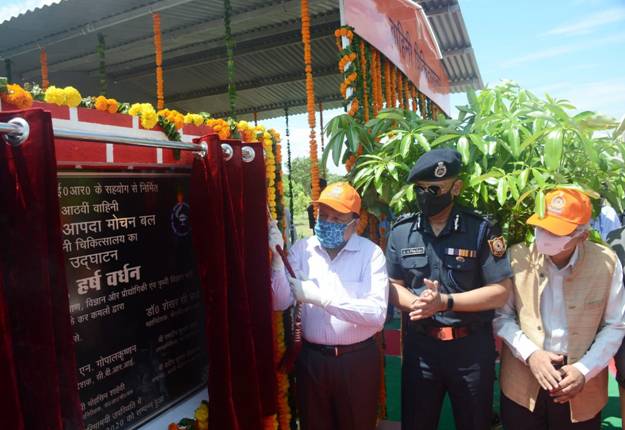
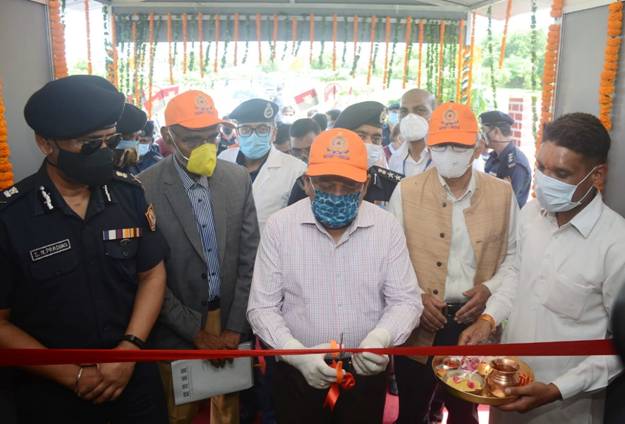
Speaking on the occasion, Dr. Harsh Vardhan said, “The makeshift hospital solution is designed to provide primary healthcare facilities with safety and security in a comfortable living environment and has a long life span of up to 20 years”. “It demonstrates a modern, durable, fast installable, safe as well as all-terrain and all-weather deployable technology useful for disaster recovery as well as pandemic or emergency situation”, he added.
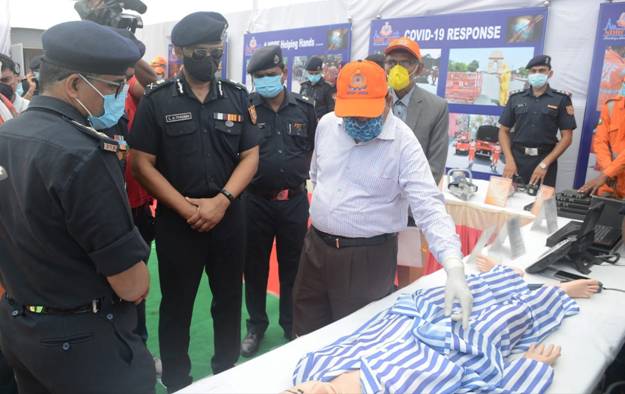
The Minister also pointed out that the country now has the capacity of carrying out over ten lakh tests for Covid-19 everyday and also boasts of more than 1500 laboratories. He said the work is currently progressing on three vaccine candidates and these are in advanced stages of trials with one of these being in the third phase of trials. Dr. Harsh Vardhan expressed the hope that our country will have a vaccine soon after the phased trials are over.
Director General, CSIR, Dr. Shekhar C. Mande said, after COVID pandemic outbreak, CSIR constituent laboratories, namely CSIR-Central Building Research Institute (CSIR-CBRI), Roorkee and CSIR-Structural Engineering Research Institute (CSIR-SERC) worked on the concept of a make-shift hospital and made modifications on its post-disaster shelter design. The laboratory introduced a foldable and framed steel structure, such that a single person can carry a couple of frames on his shoulder and assemble these at any site without much loss of time. Towards achieving a high technology readiness level, it was decided that CSIR-CBRI shall demonstrate the concept of this make-shift hospital through setting up of a 10-bedded facility, in a modular form at the NDRF’s 8th Battalion, Ghaziabad.
Director General, NDRF, Shri S. N. Pradhan said that CSIR-CBRI and NDRF worked together with great synergy and completed the assembly of the structure within 3 days. It has been named as ‘Karuna Bhawan’. Later on, NDRF has completed the furnishing of the hospital set up including the exteriors, he said.
Shri Pradhan also pointed out that National Disaster Response Force (NDRF) is a multi-disciplinary, high-tech specialist force trained to respond to disasters. NDRF has repeatedly proved its determination in the realm of disaster response and disaster risk reduction in India. He said, NDRF has contributed in a big way in COVID-19 pandemic management since January 2020 itself. NDRF conducted 473 campaign at various international airports, land ports &sea ports to train all the stakeholders including staff form security, airlines, cargo handlers, immigration etc. It has also conducted numerous COVID-19 awareness and sensitization programmes for the community across all the states, which benefited millions of our countrymen. Apart from training and awareness generation campaigns, NDRF has been assisting the state governments in various aspects of pandemic management also.
The system at Ghaziabad is designed to have features like rapid erection, foldability, light weight, safety, comfort, economicy, re-buildability, with adequate thermal insulation and water proofing and it makes use of locally available skills. The additional features include ultraviolet ray protection capability, multipurpose usage of space, high structural performance with adequate water and wind resistance, fire retardant, durability, renewable and anti-bacterial materials.
The Disaster Management authorities can keep such frame shelters ready and transport them to the site of disaster for immediate need in different states. By modularly adding more bays, shelters can be constructed for medical teams, godowns, schools, rest houses and also tourist huts in peace time.
View of the Makeshift Hospital, 8thBattalion NDRF, Ghaziabad
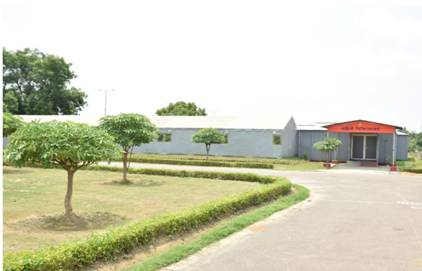
Outside View
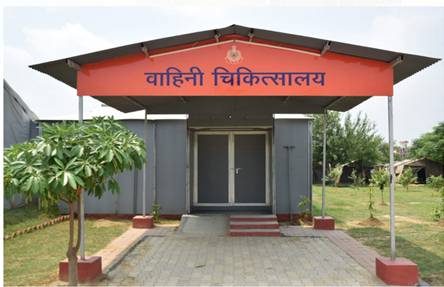
Entrance of the Hospital Facility
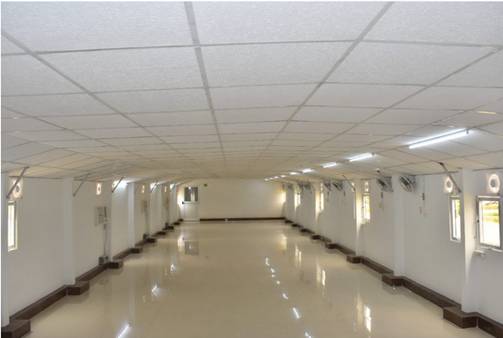
Interior View
A quick glance at the facilities available in the makeshift Hospital are:
1) 10 bedded air-conditioned ward which may be expanded to 20 beds, if required.
2) Each bed is having oxygen supply through central pipeline which is connected to 21 oxygen supply points that can be used in case of increase in number of Covid patients.
3) For critical patient, there are paramonitors which measure vitals of patients including oxygen saturation.
4) AED/defibrillators, which are used for cardiac arrest patients.
5) ECG facility.
6) One dressing room, where minor surgical work like abscess drainage /stitching/dressing of wound can be performed.
7) Small lab for routine investigations.
8) Reception /waiting area with touch-less hand sanitizing facility.
8) Washrooms with sensor-based touch-less water taps in wash basin.
9) Doctor chambers
10) Record room
11)Medicine store and dispensary with all required medicines.
12) Refrigerator for storage of essential medicines and injections.
13) Separate donning and doffing area for medical staff engaged in the treatment and care of Covid positive patients.
14) Space for parking of ambulances and emergency vehicles.




